

Craig Labovitz reporting today on Arbor Networks blog: "In their earnings call last week, Google announced a record 2010 third-quarter revenue of $7.29 billion (up 23% from last year). The market rejoiced and Google shares shot past $615 giving the company a market cap of more than $195 billion. This month, Google broke an equally impressive Internet traffic record -- gaining more than 1% of all Internet traffic share since January. If Google were an ISP, as of this month it would rank as the second largest carrier on the planet..." more
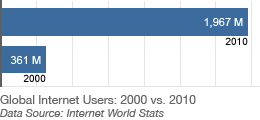 Royal Pingdom has a post on the Growth of the Internet in the past decade. From the post: "There were only 361 million Internet users in 2000, in the entire world. For perspective, that's barely two-thirds of the size of Facebook today. The chart really says it all. There are more than five times as many Internet users now as there were in 2000. And as has been noted elsewhere, the number of Internet users in the world is now close to passing two billion and may do so before the end of this year." more
Royal Pingdom has a post on the Growth of the Internet in the past decade. From the post: "There were only 361 million Internet users in 2000, in the entire world. For perspective, that's barely two-thirds of the size of Facebook today. The chart really says it all. There are more than five times as many Internet users now as there were in 2000. And as has been noted elsewhere, the number of Internet users in the world is now close to passing two billion and may do so before the end of this year." more
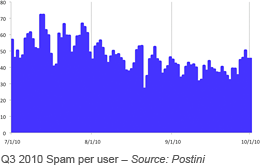 Spam and virus trends in Q3'10 confirm that spammers are still hard at work distributing malicious content in new and creative ways, according to the latest reports. The latest spam and virus trends report is produced by Postini, Google's email security and archiving service that, according to the company, processes more than 3 billion email messages per day and more than 50,000 businesses. more
Spam and virus trends in Q3'10 confirm that spammers are still hard at work distributing malicious content in new and creative ways, according to the latest reports. The latest spam and virus trends report is produced by Postini, Google's email security and archiving service that, according to the company, processes more than 3 billion email messages per day and more than 50,000 businesses. more
The U.S. became the top attack traffic source in the second quarter of 2010, accounting for 11% of observed attack traffic in total, reports Akamai in its State of the Internet Report released today. According to the report, China and Russia held the second and third place spots, accounting for just over 20% of observed attack traffic. Attack traffic from known mobile networks has been reported to be significantly more concentrated than overall observed attack traffic, with half of the observed mobile attacks coming from just three countries: Italy (25%), Brazil (18%) and Chile (7.5%). more
ARIN today recognizes Interop, an organization with a long-standing presence in the Internet industry, for returning its unneeded Internet Protocol version 4 (IPv4) address space. Interop was originally allocated a /8 before ARIN's existence and the availability of smaller-sized address blocks. The organization recently realized it was only using a small portion of its address block and that returning the remainder to ARIN would be for the greater good of the Internet community. more
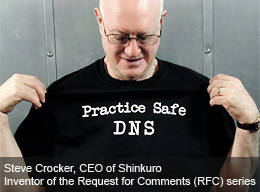 .ORG, The Public Interest Registry (PIR) has announced today the launch of a new campaign aimed at educating IT professionals about securing DNS and the adoption of Domain Name System Security Extensions (DNSSEC). The key purpose of the "Practice Safe DNS" website, according to PIR, is to "serve as a key resource for domain holders, registrars, web developers and IT professionals to learn how they can respectively play a increasingly relevant role in providing a safer and more secure Internet." more
.ORG, The Public Interest Registry (PIR) has announced today the launch of a new campaign aimed at educating IT professionals about securing DNS and the adoption of Domain Name System Security Extensions (DNSSEC). The key purpose of the "Practice Safe DNS" website, according to PIR, is to "serve as a key resource for domain holders, registrars, web developers and IT professionals to learn how they can respectively play a increasingly relevant role in providing a safer and more secure Internet." more
The Number Resource Organization (NRO) announced today that less than five percent of the world's IPv4 addresses remain unallocated. APNIC, the Regional Internet Registry for the Asia Pacific region, has been assigned two blocks of IPv4 addresses by the Internet Assigned Numbers Authority (IANA). This latest allocation means that the IPv4 free pool dipped below 10% in January, just nine months ago. Since then, over 200 million IPv4 addresses have been allocated from IANA to the Regional Internet Registries (RIRs). more
Internet Corporation for Assigned Names and Numbers (ICANN) announced today its approval of non-Latin string evaluation of Iran. This approval will allow the availability of Iran's top-level domain in its own native language, Persian, also known as Farsi (that is, the domain name .IRAN, in non-Latin characters). According to ICANN, there are currently 33 requests for Internationalized Domain Names (IDN) country code Top-Level Domains (ccTLDs) representing 22 languages out of which 18 countries/territories have so far been approved. Other countries that have also successfully passed this string evaluation by ICANN include: India, Republic of Korea, Syrian Arab Republic and Singapore. more
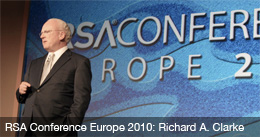 In his keynote yesterday at the RSA Security Conference, former U.S. top chief counter-terrorism adviser, Richard A. Clarke, said cyberwar defence efforts need to focus on re-architecting networks not buying more technology. more
In his keynote yesterday at the RSA Security Conference, former U.S. top chief counter-terrorism adviser, Richard A. Clarke, said cyberwar defence efforts need to focus on re-architecting networks not buying more technology. more
Paul Budde writes: "Two relatively new mobile market entrants, Mobyland and Centernet, have launched Poland and Eastern Europe's first commercial LTE network. Vendor Huawei provided the equipment for the network, which operates in the 1800MHz frequency band. Both Mobyland and Centernet previously offered GSM services in the frequency band before refarming the spectrum to offer LTE. The operators aim to expand coverage to 20% of the population by 2011 by deploying 700 base stations." more
Dutch sources are reporting that OPTA, the dutch telecommunications authority, has asked more than a dozen hotels to register as Internet service providers. The move has frustrated the Hospitality Association... more
The one-page link shortening service provider, vb.ly, has been seized with no apparent warning by the Libyan government which manages the ".ly" county code Top-Level Domain (ccTLD). According to reports, Nic.ly, the registry operator of the ccTLD in Libya informed the user of the domain that the content of its website was considered offensive, obscene and illegal by the Libyan Islamic Sharia Law and therefore revoked. more
A recent study released today suggests 53 percent of critical infrastructure providers have experienced what they perceived as politically motivated cyber attacks. According to Symantec's 2010 Critical Information Infrastructure Protection (CIP) Survey, participants claimed to have experienced such an attack on an average of 10 times in the past five years, incurring an average cost of $850,000 during a period of five years to their businesses. more
The National Telecommunications and Information Administration (NTIA) is hosting a workshop today discussing the state of IPv6 in the U.S. and its impact on the industry, government, and the Internet economy. The moderators for the workshop are Aneesh Chopra, Chief Technology Officer of the United States and Vivek Kundra, Chief Information Officer of the United States. Participants include... more
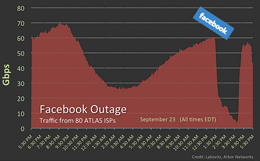 Craig Labovitz reporting from Arbor Networks: "We use ATLAS data to graph Facebook (AS32934) traffic with 80 ISPs around the world between 5pm September 22 and 5pm EDT today. You can see Facebook traffic plummet around 1:30pm and return shortly after 4pm. From a quick glance at the data, the outage appears to be global (impacting most of the 80 ISPs)." more
Craig Labovitz reporting from Arbor Networks: "We use ATLAS data to graph Facebook (AS32934) traffic with 80 ISPs around the world between 5pm September 22 and 5pm EDT today. You can see Facebook traffic plummet around 1:30pm and return shortly after 4pm. From a quick glance at the data, the outage appears to be global (impacting most of the 80 ISPs)." more
Sponsored byVerisign

Sponsored byIPv4.Global

Sponsored byCSC

Sponsored byDNIB.com

Sponsored byRadix

Sponsored byWhoisXML API

Sponsored byVerisign
